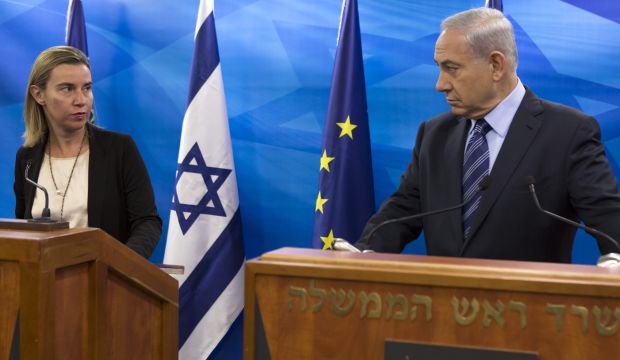
EU foreign policy chief Federica Mogherini (L) makes a statement beside her host, Israeli Prime Minister Benjamin Netanyahu in Jerusalem on November 7, 2014. (EPA/Jim Hollander/Pool)
Jerusalem and Gaza, Reuters—The EU’s new foreign affairs chief said on Friday that a surge of violence in Jerusalem made it all the more critical that Israel and the Palestinians return to negotiations quickly.
Speaking after talks with Israeli Foreign Minister Avigdor Lieberman, Federica Mogherini said the European Union stood with Israel when it came to defending its citizens, but that the unrest was a serious concern.
“The risk of growing tensions here in Jerusalem . . . is that, if we do not move forward on the political track, we will go back, and back again to violence,” the Italian told reporters during her first official visit to the region. “That’s why I see an urgency in moving forward on the dialogue.”
The last talks between Israel and the Palestinians broke down in April after months of largely fruitless negotiation, with the Palestinians angry at the continued building of Jewish settlements in occupied territory, and Israel furious at attempts to bring the Islamist group Hamas, which officially denies Israel’s right to exist, into the Palestinian government.
Jerusalem has seen a wave of unrest over the past four months, since before the July-August Gaza war. Violence has spiked in the past two weeks, with Palestinian drivers ramming into Israeli pedestrians, killing four people.
A focus of Palestinian and regional anger has been a dispute over Jerusalem’s holiest site, known to Muslims as the Noble Sanctuary and to Jews as Temple Mount.
For decades, Israel has maintained a ban on Jews praying at the site, which houses the Dome of the Rock and the 8th-century Al-Aqsa mosque. It was also the site of ancient Jewish temples.
In recent weeks, a campaign by far-right Jewish nationalists to be allowed to pray at the site has gathered momentum, leading to clashes at the compound between Israeli security forces and Muslim worshippers angry at what they see as an assault on a shrine that is administered by Islamic authorities.
While a Jordanian religious trust oversees Al-Aqsa, Israel provides the security. Last week it shut down all access to the site for the first time in more than a decade. Jordan withdrew its ambassador as a result.
After meeting Mogherini on Friday, Israeli Prime Minister Benjamin Netanyahu reiterated that the status quo governing Temple Mount would not change, a message he also sent to Jordan’s King Abdullah in a phone call on Thursday.
Despite his calls for calm, the streets of East Jerusalem, which is predominantly Palestinian, have seen clashes between Israeli security forces and Palestinians hurling rocks, Molotov cocktails and firecrackers.
Netanyahu has accused Palestinian President Mahmoud Abbas of instigating the violence, putting the prospect of any return to negotiations even further out of reach.
As well as tensions between Israel and the Palestinians in Jerusalem and the occupied West Bank, there is deep friction between Abbas’s Fatah movement and the Islamist group Hamas, which controls Gaza.
While Fatah and Hamas agreed to form a “reconciliation” government in June—putting aside differences that have existed since a conflict in 2007—there is still deep animosity between them, and efforts to put the unity cabinet to work have failed.
On Friday, around 15 small explosions targeted the homes and vehicles of Fatah officials in Gaza, causing minor damage but no injuries, witnesses and members of Fatah said.
The explosions came days ahead of the tenth anniversary of the death of Yasser Arafat, the late Palestinian president and Fatah leader. One of the targets hit was a stage where Arafat’s commemoration is scheduled to be held on November 11.
Fatah and Hamas blamed each other for the blasts, while a letter left at one site claimed responsibility by the Islamic State of Iraq and Syria, a claim dismissed by Gaza officials.
“We will not allow the return of internal conflicts, chaos and anarchy to the Gaza Strip,” said Eyad Al-Bozom, a spokesman for the Interior Ministry, run by officials loyal to Hamas.
“The security services will pursue anyone who had any connection to these criminal acts until they are brought to justice.”
The tensions between Fatah and Hamas, which has dominated Gaza since 2007, have complicated efforts to rebuild the coastal enclave after the July-August war, in which more than 2,100 Palestinians were killed, as well as more than 70 Israelis.
Israel is reluctant to allow a free flow of goods and rebuilding materials across its borders with Gaza until the Palestinian Authority, led by Fatah, has taken over responsibility for administering the territory from Hamas.
Mogherini was due to visit Gaza on Saturday, holding meetings with the Palestinian prime minister and Abbas.
